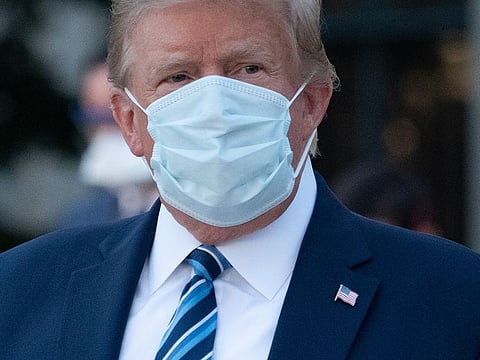COVID-19 puts White House incompetence on full display
If the polls are to be believed, voters are about to give Trump a ‘surprise’ message

Every political campaign hopes for an October surprise to shift the November election their way.
US president Donald Trump’s COVID-19 diagnosis and hospitalisation may be the worst self-inflicted October surprise any candidate ever stumbled into.
Trump didn’t plan to get sick, of course. But his refusal to wear a mask or keep people at a safe distance made him vulnerable to the coronavirus and helped turn the White House into a hot zone, with at least a dozen positive cases.
For months, Trump and most of his aides flouted public health guidelines. They staged campaign rallies and White House ceremonies, including one on Sept. 26 to introduce Supreme Court nominee Amy Coney Barrett that may have been a superspreader event.
Even after the president spent three days in the hospital, the White House didn’t try to track down the hundreds of people with whom he or his aides had met - and possibly infected.
On his return from the hospital, Trump took off his mask and posed for a video. “Don’t be afraid of it. You’re going to beat it,” he said of COVID-19.
If the president intended to reassure Americans, he instead displayed the Trump traits that voters like least: his self-absorption, his disdain for scientific advice - and his failure to express any empathy for the more than 210,000 Americans who have died of COVID-19 in the last six months.
It also showed the incompetence that has been one of Trump’s trademarks for the last four years.
Last spring, the pandemic handed the president a difficult challenge: organise a coherent national response to a deadly virus no one had seen before.
Trump bungled the job. He insisted the virus was no worse than a seasonal flu when - by his own admission - he knew it was far more deadly.
He launched a federal effort to coordinate medical supplies, then abandoned the effort and told governors they were on their own.
He promised tests for everyone, and he never delivered.
He encouraged supporters to stage uprisings against Democratic governors who wanted lockdowns, and he praised Republican governors who reopened their economies too hastily.
His administration did do some things right. It sent billions of dollars to pharmaceutical companies to jump-start development and testing of experimental vaccines. It ordered industrial firms to make ventilators and ended up with a surplus.
But the overall results have been tragic.
The US death rate, which Trump claims is a success, is more than double that of Canada, more than five times that of Germany and almost 80 times that of South Korea, on a per capita basis.
Inevitably, Trump’s failure to lead during the pandemic has emerged as the biggest issue of the presidential race _ despite his repeated efforts to blame others or change the subject.
His hospitalisation for COVID-19 guaranteed that the crisis will remain Topic A until Election Day, now only a month away.
The irony is that Trump won the presidency in 2016 partly by claiming to be a successful businessman who could run the federal government more wisely than any politician.
That claim, like many others, turned out to be false.
The trouble began even before Trump’s inauguration, when he threw away the transition strategy that former New Jersey Gov. Chris Christie had prepared. Trump instead appointed Cabinet officers he barely knew or vetted and plunged into the presidency without any formal policy blueprint, a recipe for infighting.
Soon, negotiations over spending bills and other legislation were upended by Trump’s tweets _ as happened again Tuesday, when he abandoned talks with Democrats toward an economic stimulus bill to help businesses and individuals struggling with COVID-19 shutdowns.
Another priority, deregulation, has been hobbled by Trump’s failure to recruit qualified staff. The Trump administration has lost 84% of its regulation cases in court; most administrations lose 30%, according to a New York University study.
“Many of his executive orders have been badly written, and that gets them overturned by the courts,” Elaine Kamarck, director of the Center for Effective Public Management at the non-partisan Brookings Institution, told me. “If you say you’re going to dismantle regulations, you need very competent people to walk them through the regulatory process. He doesn’t have them.”
Trump’s staff has seen a record level of turnover - some because of scandals, others because they fell out of favour.
In less than four years, he’s on his fourth chief of staff, his fourth national security adviser, his sixth director of communications.
“What COVID shows is that incompetence is damaging to the country,” said Kamarck, who worked on government reform for President Bill Clinton. “We’re in a mess we shouldn’t be in.”
For critics, the president’s inability to run a disciplined operation has one saving grace: It has damaged his political fortunes, perhaps irretrievably. Incompetence, it appears, has political consequences.
His reelection campaign has floundered. It has focused on shoring up his base of white working-class voters and evangelicals, instead of expanding his coalition toward a majority. It has burnt through hundreds of millions of dollars and is short of cash in the final weeks.
At his first debate with Democratic nominee Joe Biden last month, Trump sounded petulant instead of presidential, ringing alarms even within his own party.
If the polls are to be believed, voters are about to give their employee in chief a message he may find familiar: You’re fired.
Los Angeles Times







